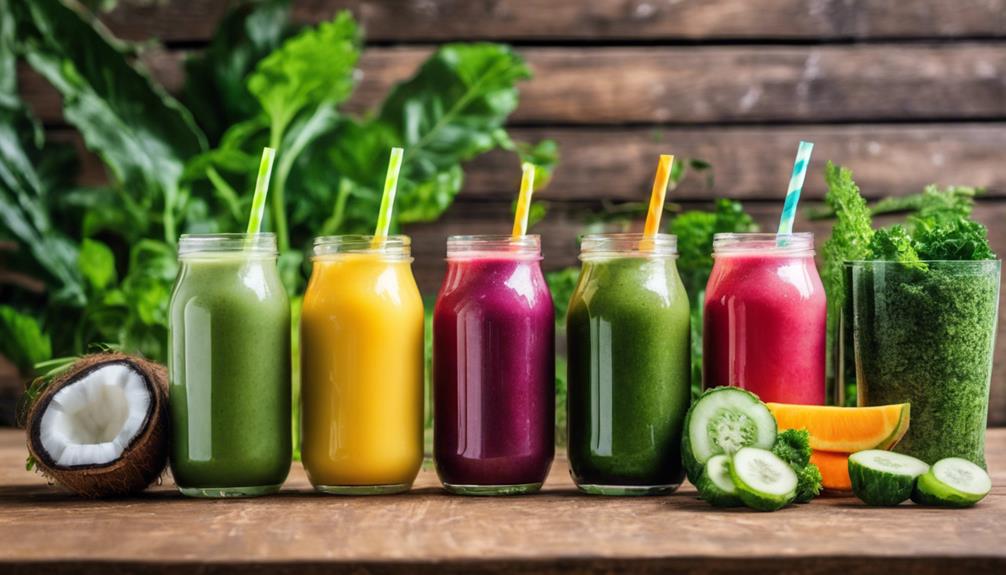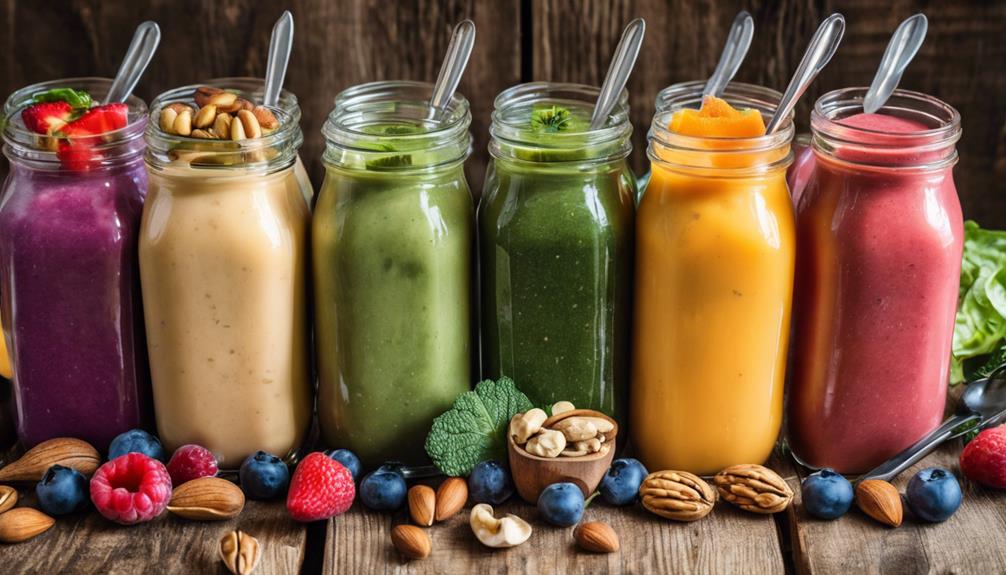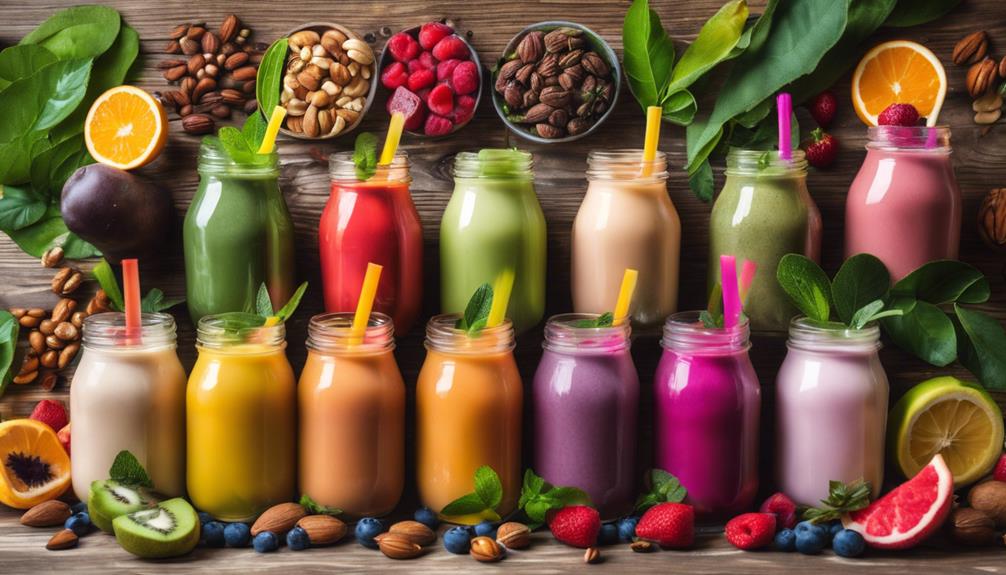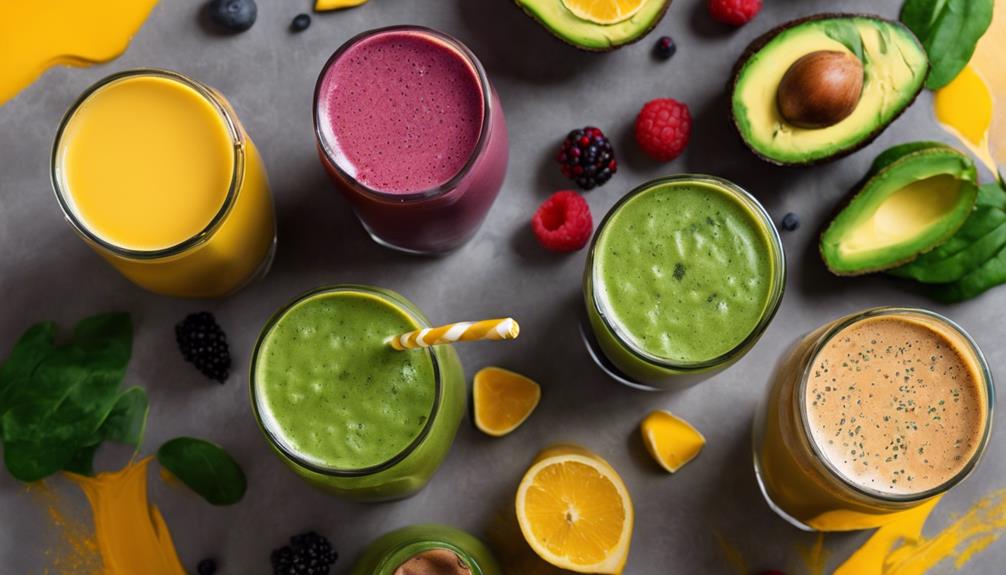When choosing the best health drink for adults, consider your personal health goals. Green tea offers antioxidants that boost metabolism and support heart health. Smoothies can be nutrient-dense, packed with vitamins, minerals, and healthy fats. For hydration, coconut water is a natural option, replenishing electrolytes without excess calories. If you're looking for energy and muscle recovery, protein shakes come in handy. Herbal infusions like chamomile or hibiscus provide added benefits for digestion and heart health. Each drink has its unique advantages, making it essential to find what suits you best. You'll discover more about each option and their benefits soon!
Popular Health Drinks Overview

When exploring popular health drinks for adults, you'll find a diverse range of options that cater to various nutritional needs and preferences.Is Yoga Cardio
Kombucha has gained popularity due to its potential health benefits, including improved digestion and immune support. This fermented tea contains probiotics, which can promote gut health and potentially enhance your overall well-being.
Electrolyte drinks are another popular choice, especially for those who lead active lifestyles. These beverages are designed to replenish essential minerals lost through sweat, helping maintain hydration and energy levels. They're particularly beneficial after intense workouts or during hot weather. Many electrolyte drinks are fortified with vitamins and minerals, providing an additional nutritional boost.
When choosing a health drink, consider your individual needs. If you're looking for gut health support, kombucha might be the way to go. On the other hand, if you're focused on hydration and recovery, electrolyte drinks could be more suitable.
Balancing these options with a well-rounded diet can enhance your overall health and wellness. Always read labels to ascertain you're selecting a product that aligns with your health goals.
Benefits of Green Tea
Green tea offers significant health benefits, particularly due to its high antioxidant content, which helps protect your body from oxidative stress.
Additionally, studies suggest that it can support weight management by boosting metabolism and promoting fat oxidation.
Understanding these points can help you make informed choices about incorporating green tea into your daily routine.
Antioxidant Properties Explained
Packed with powerful antioxidants, green tea offers numerous health benefits that can enhance your overall wellness. The primary antioxidants in green tea, known as catechins, are among the most potent antioxidant sources you can find.
These compounds play an essential role in protecting your cells from oxidative stress caused by free radicals, which can damage cellular structures and lead to chronic diseases.
Research has shown that regular consumption of green tea can improve your body's ability to combat oxidative stress, providing cellular protection that may reduce the risk of certain illnesses. Studies indicate that individuals who drink green tea may experience a lower incidence of heart disease and improved brain function, thanks in part to these protective antioxidants.
Moreover, the anti-inflammatory properties of green tea can further support your immune system and overall health. By incorporating green tea into your daily routine, you're not only enjoying a revitalizing beverage but also investing in a drink that supports your body's defenses against harmful oxidative processes.
This makes green tea a valuable addition to your health regimen, promoting longevity and energy while delivering a host of protective benefits.
Weight Management Support
Many people turn to green tea as a natural aid for weight management due to its ability to boost metabolism and enhance fat oxidation. Research indicates that the catechins found in green tea can increase your metabolic rate, helping you burn more calories even at rest. This effect can be particularly beneficial if you're trying to manage your caloric intake.
Incorporating green tea into your daily routine may also support fat loss, especially when combined with a balanced diet and regular exercise. Studies have shown that individuals who consume green tea extract experience a greater reduction in body weight compared to those who don't. This is largely attributed to the tea's capacity to improve fat oxidation during exercise, making your workouts more efficient.
However, it's important to remember that while green tea can support your weight management efforts, it's not a magic solution. A sustainable approach should always focus on maintaining a healthy caloric balance, ensuring you consume fewer calories than you expend.
Nutritional Value of Smoothies

Smoothies can be a powerhouse of nutrition when you choose the right ingredients.
By understanding key nutrients and how various combinations can enhance your health, you can create a drink that fits your dietary needs.
Additionally, paying attention to timing and portion sizes can maximize their benefits for your overall wellness.
Key Nutrients in Smoothies
A well-crafted smoothie can deliver a variety of essential nutrients, providing a convenient way to boost your daily intake of vitamins, minerals, and antioxidants. By carefully selecting your smoothie ingredients, you can create a nutrient-dense drink packed with health benefits.
Leafy greens like spinach or kale are excellent sources of vitamins A, C, and K, while fruits such as bananas and berries add fiber and natural sugars.
Adding nuts, seeds, or yogurt can enhance protein content, which is vital for muscle repair and overall health. Including sources of healthy fats, like avocado or nut butters, supports nutrient absorption, particularly for fat-soluble vitamins like A, D, E, and K.
Moreover, incorporating ingredients rich in antioxidants, such as berries or citrus fruits, can help combat oxidative stress in your body.
The unique combination of smoothie ingredients not only provides a balanced nutritional profile but also makes it easier for your body to absorb these nutrients effectively.
Ingredient Combinations for Health
Choosing the right ingredient combinations in your smoothies can greatly enhance their nutritional value, helping you meet your health goals more effectively. To maximize benefits, consider ingredient synergy, where different components work together to boost nutrient absorption and overall health. For instance, pairing spinach with citrus fruits not only provides a rich source of vitamins but also enhances iron absorption thanks to vitamin C.
It's equally important to achieve flavor balance. While you may want to pack your smoothie full of superfoods, remember that taste matters too. Combining sweet fruits like bananas or berries with greens can create a delicious blend, making it easier to consume and enjoy.
You can also add a source of healthy fat, like avocado or nut butter, to create a smoother texture and increase satiety.
Experiment with various combinations to find what works best for you. Don't hesitate to include ingredients like Greek yogurt for protein or chia seeds for fiber.
Ultimately, the right mix not only enhances the nutritional profile of your smoothie but also makes it a delightful part of your daily routine.
Timing and Portion Sizes
Timing your smoothie consumption and understanding portion sizes can greatly impact its nutritional value and your overall health outcomes.
For best consumption, consider when you're most active or need a nutritional boost. Mornings are often ideal, as a smoothie can kickstart your metabolism and provide energy for the day ahead. Alternatively, post-workout consumption can aid in muscle recovery, especially when your smoothie includes protein-rich ingredients.
Portion sizes also matter; a typical serving ranges from 8 to 16 ounces. Overloading your smoothie can lead to excessive calorie intake, negating its health benefits. Focus on balanced ingredients—fruits, vegetables, and healthy fats—and aim for around 300 to 500 calories per serving, depending on your activity level and dietary goals.
Implementing timing strategies can enhance your smoothie's effectiveness. For instance, if you're using it as a meal replacement, verify it contains sufficient protein and fiber to keep you satisfied.
Hydration With Coconut Water
Coconut water serves as a natural source of hydration, providing essential electrolytes that can replenish your body's fluids after exercise or during hot weather. Rich in potassium, sodium, and magnesium, it helps maintain proper hydration levels, especially when you're sweating.
Unlike many sports drinks, coconut water contains fewer calories and less sugar, making it a healthier option for rehydration.
One of the key coconut water benefits is its ability to restore electrolyte balance. This is particularly important after workouts or strenuous activities, as it can help prevent muscle cramps and fatigue. Studies show that coconut water is as effective as traditional sports drinks for hydration, making it a suitable alternative for those looking to avoid artificial additives.
Moreover, its natural sweetness and invigorating taste can make hydration more enjoyable. Whether you're sipping it straight from the coconut or enjoying it in a smoothie, incorporating coconut water into your routine can enhance your hydration strategy.
Just remember, while it's a great addition, it shouldn't completely replace water as your primary source of hydration. Balancing both will keep you feeling your best.
Protein Shakes for Energy

Protein shakes can be an excellent way to boost your energy levels and support muscle recovery after workouts. By incorporating high-quality protein sources, such as whey, casein, or plant-based proteins, you can effectively enhance your post workout recovery. These shakes provide essential amino acids that help repair muscle fibers and reduce soreness, allowing you to bounce back quicker for your next workout.
Research shows that consuming protein shortly after exercising can optimize muscle protein synthesis. This is vital for anyone looking to improve their strength or endurance. When you blend protein powder with ingredients like fruits, yogurt, or milk, you not only increase the nutritional value but also create a balanced meal that sustains energy levels.
However, it's important to choose protein shakes wisely. Not all protein sources are created equal, and some may contain added sugars or artificial ingredients. Look for options with minimal additives and a well-rounded nutrient profile.
Herbal Infusions and Their Benefits
Herbal infusions offer a natural way to enhance your overall well-being, as they're rich in vitamins, minerals, and antioxidants that can support various bodily functions. These beverages come in various infusion types, including chamomile, peppermint, and hibiscus, each bringing unique herbal benefits.
Chamomile, for example, is renowned for its calming properties and may help improve sleep quality. Peppermint, on the other hand, is often used to aid digestion and alleviate headaches. Hibiscus has been shown to support heart health by helping maintain healthy blood pressure levels.
Incorporating these infusions into your daily routine can provide a revitalizing alternative to sugary drinks, while also delivering essential nutrients. Many herbal infusions are naturally caffeine-free, making them suitable for any time of day.
It's essential to choose high-quality herbs for your infusions, as the potency of the herbal benefits can vary greatly. When brewed properly, herbal infusions can be a flavorful and healthful addition to your diet.
Choosing the Right Drink for You

Selecting the right health drink for your needs involves understanding your personal health goals, dietary restrictions, and flavor preferences.
Start by identifying what you want to achieve. Are you looking to boost energy, improve digestion, or enhance hydration? This clarity will guide your choices.
Next, consider your dietary restrictions. If you're lactose intolerant, for instance, avoid dairy-based drinks. People with diabetes should be cautious of sugary beverages, while those looking for protein might opt for shakes or smoothies.
Personal preferences also play an essential role. If you dislike the taste of greens, a vegetable-based drink mightn't be right for you. Instead, look for fruit-based options that can provide similar nutrients without compromising flavor.
Conclusion
Choosing the best health drink for adults really depends on your individual needs and preferences.
Green tea offers antioxidants, while smoothies provide essential nutrients.
Hydration from coconut water is invigorating.
If you need an energy boost, protein shakes can be effective.
Herbal infusions also present various health benefits.
By understanding the nutritional value and potential effects of these drinks, you can make an informed choice that aligns with your health goals and lifestyle.
